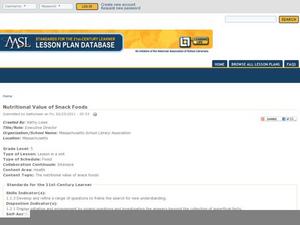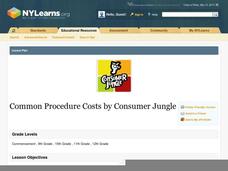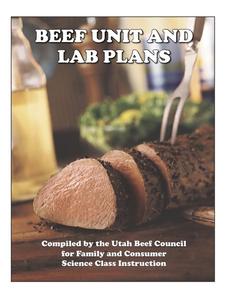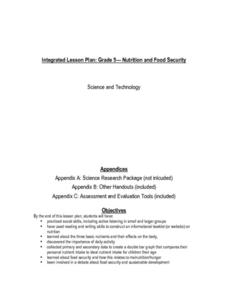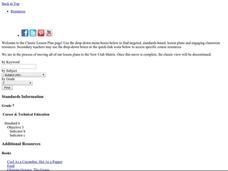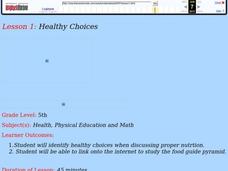Curated OER
The nutritional value of snack foods
This lesson is intended as preparation for a school health fair but could be used anytime. Learners discuss and compare the nutrition found in typical snack foods. They compose investigative questions, collect data, and research a...
Curated OER
Avoiding Consumer Fraud: Financial Scams and Schemes
Young consumers get a hefty dose of information on how fraud can put their financial health at risk. The resource provides detailed lecture notes, scaffolded notetaking sheets, vocabulary worksheets, transparencies, and seven links to...
Curated OER
Common Procedure Costs
Kids never think about the cost of medical expenses, because they never think they'll get hurt. To better understand personal financial planning, learners research common medical procedures and their costs. They use a worksheet and the...
Curated OER
HIV/AIDS: Basic Facts
Students investigate human sexuality by researching STD's. In this HIV lesson, students discuss the potential risk of getting a sexually transmitted disease such as HIV which can cause illness and death. Students assess their own...
Curated OER
Basic Vitamins: Water-Soluble and Fat-Soluble
Students examine vitamins and study their functions and food sources. They research what happens to vitamins when foods are overcooked. They prepare a microwaveable vegetable quiche.
Curated OER
Basic Vitamins: Water-Soluble and Fat-Soluble
An incredibly thorough lesson on vitamins, and how to keep one's body at peak health. Learners access a variety of excellent worksheets embedded in the plan that have them consider raw vs. cooked foods, a vegetable nutrition summary,...
California Department of Education
Hazards in the Workplace
Safety first! Safety first! A short video and a PowerPoint presentation introduce job seekers to child labor law awareness, safety standards, and ways to reduce workplace injuries. Class members first take a short workplace...
Baylor College
Your Energy Needs (BMR)
How many Calories one needs on a daily basis is dependent on a number of factors including gender, height, and activity level. In the third of seven lessons about energy and food, young nutritionists calculate the number of Calories...
Utah Beef Council
Beef Unit and Lab Plan
What are the proper methods for cooking various cuts of beef? What are some basic rules regarding meat food safety? Here you'll find 10 lab plans with a variety of beef cookery activities, perfect for a home economics or cooking course.
Curated OER
What's on My Plate?
Kids work together in groups to discuss and understand the differences between a typical diet and a healthy one. They use the My Plate recommendations to compare what they eat with what they should be eating according to the MyPlate...
PBS
Ebola Outbreak
As of April, 2016, more than 28,000 suspected cases of Ebola were recorded in Western Africa with over 11,000 human deaths. Classes discuss the Ebola virus outbreak in 2014 and then groups develop an action plan based on...
Curated OER
Nutrition and Food Security
Examine the three basic nutrients and their effects on the body. Fifth graders will research data to construct a bar graph and then demonstrate the relationship between malnutrition and food security. This is a very comprehensive...
Serendip
Should You Drink Sports Drinks? When? Why?
New research proves even rinsing your mouth with carbohydrates without swallowing improves performance of the central nervous system. While some think sports drinks are amazing, others say they are a waste of money. Scholars learn about...
Curated OER
First-Aid Newspaper
Eighth graders research, write, edit and publish a class newspaper focusing on topics related to first aid. They research how to care for injuries and write informative articles for the paper. Students compile the articles to produce a...
Kenan Fellows
Unit 4: The Brain
Drugs interact with the brain to alter moods, emotions, and behaviors by changing the brain's chemistry, perceptions, and interactions. The final lesson in the Pharmacology unit shows scholars experiments, has them complete four labs,...
Curated OER
Weight Training: Lifetime Fitness
Young scholars research the relationship between physical activity and the prevention of illness, disease and premature death. Students understand that working out regularly will increase muscular strength, endurance and improve many...
Whole Person Associates
Teen Self Esteem Workbook
Happy teens are healthy teens! Pupils embark on a self-reflective journey using a series of assessments and discussions to promote personal development. The lessons focus on identifying low and high self-esteem attitudes and behaviors,...
Curated OER
The Quicker the Better? Food Processing
Kids explore food choices, nutrition, and agriculture through a variety of sources and activities. They research unknown words on food labels, test the salt content in canned vs non-canned foods, and discuss processed foods. The lesson...
Curated OER
Burn Baby Burn
Students use the Internet to research information on the food pyramid, recommended daily allowances of nutrients, caloric intake and expenditure, and value of foods. They analyze their own eating habits and exercise level.
Curated OER
Background of Diseases-- Germs or Genes?
Students explore the background of common diseases. In this personal health lesson, students research causative agents of communicable and non-communicable diseases. Students use their research findings to create data tables in Microsoft...
Curated OER
A New You!
Science learners journal familiar ways that the human body can regenerate or heal itself. In small groups, they research and create a poster of current information on stems cells and how they can be used to regenerate. The article for...
Curated OER
4-H Dairy Activity Page; Ethical Decision Making
Get your 4-H farmers ready for their dairy project with this activity page, which focuses on helping students form ethical decisions. A variety of activities, including a scavenger hunt, a word search and viewing the anatomy of a dairy...
Curated OER
Healthy Choices
Fifth graders discover how to make healthy choices in nutrition. In this nutrition lesson, 5th graders research the daily nutrition requirements recommended by the U.S. Department of Agriculture. Students keep a food diary for three days...
Curated OER
Train the Body, Train the Brain
An article from the New York Times, 2010, titled "Phys Ed: Can Exercise Make Kids Smarter?" is the springboard for the six short-answer questions posed by The Learning Network. Have your class read the article, answer the questions, and...
